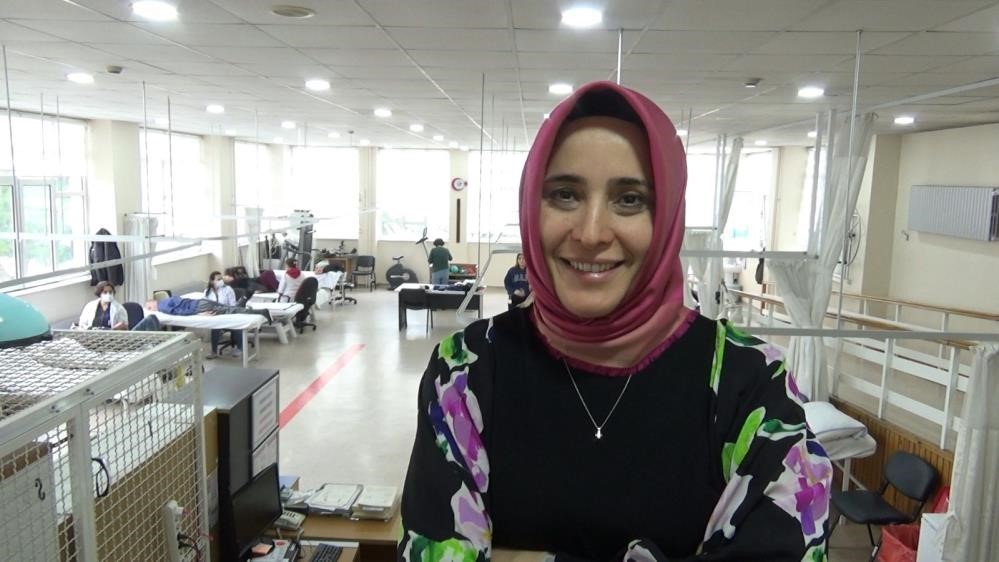Regular blood donation is beneficial for heart and lung health
Pediatric Hematology and Oncology Specialist Dr. Assistant Professor Başak Adaklı Aksoy, who emphasizes the effects of blood donation, says, “Regular blood donors experience the spiritual joy of helping people on one hand, while on the other hand, with the medical screenings they go through beforehand…”

Pediatric Hematology and Oncology Specialist Dr. Assistant Professor Başak Adaklı Aksoy, who discusses the effects of blood donation, stated, ‘Regular blood donors not only experience the spiritual pleasure of helping people but also ensure the control of their health conditions through medical screenings they pass through before donation. Through blood donation, the production of blood cells in the body is stimulated by activating bone marrow cells, leading to an increase in the production of cells in the system and the renewal of blood cells in the body. Additionally, it has been reported that regular blood donation has positive contributions to heart and liver health.’
On the occasion of World Blood Donor Day on June 14, Pediatric Hematology and Oncology Specialist Dr. Assistant Professor Başak Adaklı Aksoy made statements about the importance of blood donation.
‘Blood is a continuous need’
Emphasizing the importance of blood donation, Dr. Assistant Professor Aksoy stated, ‘Blood is a continuous need. Every day in our country, thousands of patients need blood. Planned surgeries, accidents, known blood diseases, and many other conditions may require blood from patients of all ages. From birth to death, we may need blood at any moment. Extraordinary situations like earthquakes can increase the need for blood. Meeting the need for blood is only possible through the donations of voluntary donors.’
‘Drink plenty of fluids after blood donation’
Dr. Assistant Professor Aksoy, talking about what should be considered before and after blood donation, said, ‘First and foremost, the donor must be voluntary. It is important that the donor has read, understood, and answered questions clearly by signing the informed consent form. The person who will donate blood should not have consumed alcohol in the last 24 hours before the donation, should not have taken any medication except those that need to be taken regularly, should have had a light meal in the last hour, and should not be hungry. After blood donation, the person should be in a resting position for the first hour, drink plenty of fluids, not smoke for two hours following the donation, and especially avoid tasks that require attention.’
‘Conditions that may prevent blood donation’
Dr. Assistant Professor Aksoy listed the conditions that may prevent blood donation as follows: ‘Fever of unknown origin, sexually transmitted diseases, history of substance abuse, HIV, Hepatitis B, Hepatitis C infections, and any blood disease that may cause bleeding or clotting disorders will prevent blood donation.’
‘Blood cells are renewed in the body’
Discussing the effects of blood donation on the body, Dr. Assistant Professor Aksoy stated, ‘By stimulating the work of bone marrow cells that produce blood, the production of cells in the system increases, and blood cells in the body are renewed. Regular blood donors not only experience the spiritual pleasure of donating blood and helping those in need but also ensure the control of their health conditions through the inquiries and partial medical screenings they go through before. It has been reported that blood donation has positive contributions to heart and liver health. As long as the informed consent form is clearly and accurately answered, eligibility for blood donation is evaluated by the blood center, so there is no known harm in blood donation.’
‘Women can donate blood every 4 months, men every 3 months’
Dr. Assistant Professor Aksoy emphasized that whole blood donation can be done in women every 4 months and in men every 3 months, stating, ‘Anyone between the ages of 18-60 with suitable health can be a donor. The body weight of the donor should be at least 50 kilograms. Those with suspected pregnancy and pregnant women are not accepted for blood donation. If there are no problems felt by women, menstrual period does not prevent donation, but the donor is asked to drink plenty of fluids and rest on that day. Since the daily fluid intake decreases during the month of Ramadan, blood donation is recommended after breaking the fast. Those who have undergone a surgical procedure in the last 3 months cannot be donors.’







